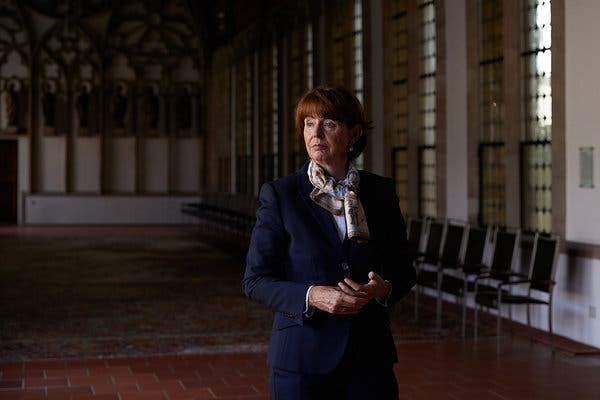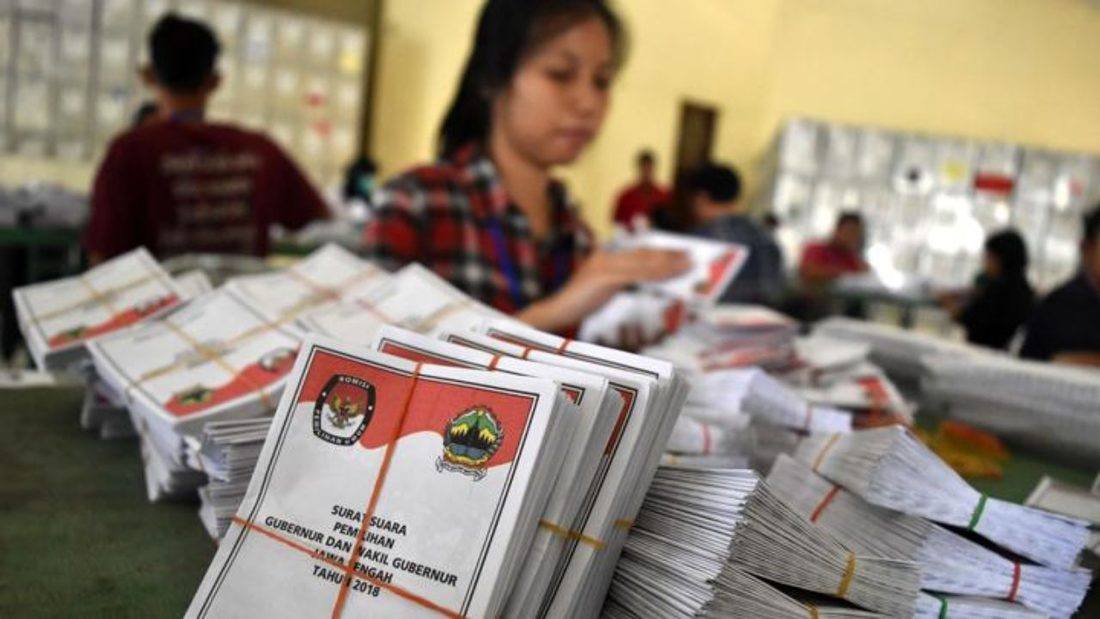Advertisement
As the far right gains traction, harassment and intimidation of local officials are mounting, threatening democracy at the grass roots.

COLOGNE, Germany — The last time Henriette Reker ran for mayor, she was nearly killed.
Ms. Reker was handing out flowers to voters at a bustling market in Cologne in 2015, when a man took a rose with one hand and rammed a kitchen knife into her throat with the other. He wanted to punish her for her pro-refugee stance.
Five years later, Ms. Reker is running again. But she is an exception. Since she recovered from a coma to find herself elected, far-right death threats have become an everyday reality, not just for her but for an increasing number of local officials across Germany.
A ground war is raging in the country, and the battlefield is town halls and village streets, where mayors now find themselves routinely on the front lines as the targets of threats and intimidation. The effect has been chilling.
Some have stopped speaking out. Many have quit, tried to arm themselves or taken on police protection. The risks have mounted to such an extent that some German towns are unable to field candidates for leadership at all.
“Our democracy is under attack at the grass-roots level,” Ms. Reker said in a recent interview in Cologne’s City Hall. “This is the foundation of our democracy, and it is vulnerable.”
The trend, the local officials and analysts say, reflects a worrying breakdown of civility and political discourse in an increasingly polarized Germany, where the insidious influence of an angry far right is changing the rules of behavior.
Mayors, certainly, have not been the only ones to suffer as Germany’s political and social fabric has strained. The shootings this week in the western town of Hanau, near Frankfurt, that left 11 dead were just the latest attacks aimed at ethnic minorities.
Germans who openly support immigration have increasingly been targeted, too. Given the decentralized nature of Germany’s political system, local officials like mayors may be the most important among them. Attacks against them take on outsize significance.
Over the last year, there were 1,240 politically motivated attacks on politicians and elected officials in Germany, according to preliminary figures released this year by the federal police.
A study conducted by the German Association for Cities and Municipalities showed that 40 percent of the country’s city government had to contend with stalking, harassment or threats. Of the 11,000 mayors in the country, at least 1,500 reported concrete threats.
And people have died. In June, Walter Lübcke, a regional official was killed on his front porch by a known extremist, the first far-right assassination of a German politician since World War II.
Supporters of far-right ideology were responsible for more than a third of the reported incidents, nearly twice as many as were committed by supporters of the extreme left, the government said.
But nearly half of all politically motivated attacks could not be attributed to any specific group, reflecting what experts said showed the erosion of civil norms as far-right ideology encroaches on the mainstream.
Experts and local officials who have been affected say the violence started when the 2008 economic crisis began to bite. But it took on new dimensions in 2015, after Chancellor Angela Merkel opened the borders to more than one million mostly Muslim asylum seekers, many fleeing wars in Syria, Iraq and Afghanistan.
Andreas Zick, the director of the Institute for Interdisciplinary Research on Conflict and Violence at the University of Bielefeld, has been tracking the mood of German society for decades.
He said he first noticed groups of people calling themselves “concerned citizens” who were critical of politicians emerge more than a decade ago.
They have now morphed into a concerted campaign of hate against local politicians and representatives, he said, driven by populist forces such as the far-right Alternative for Germany, a party known by its German initials, AfD.
“The populists have declared the ‘elites’ as their enemy, and now we are seeing the rise of this politics of hate which has infected the center of society,” Mr. Zick said.
Ms. Lücke, the mayor of Pulsnitz in the eastern German state of Saxony, has herself been targeted by hate campaigns.
“The arrival of the refugees was a catalyst,” she said, “but it would have happened regardless.”
She attributed the rise in violence to a toxic cocktail of an “anything goes” culture on social media, a dearth of social services and a lack of understanding among eastern Germans about the how a representative democracy works.
“We as a society have lost the ability to respect one another, or those in government,” said Ms. Lücke, an independent.
“There are no boundaries anymore and no understanding for how to respond when my idea of freedom is in conflict with someone else’s idea of freedom,” she said. “We have forgotten how to resolve conflicts.”
By some accounts, the atmosphere has become particularly toxic in the former Communist East, where the AfD wins on average one in four votes and many more in rural areas.
Markus Nierth, a pastor who was mayor of the small eastern village of Tröglitz, wanted to integrate 40 refugees into his community. He immediately became the target of graphic far-right threats.
First the hateful messages were directed to him, then they were written to his wife, too. Mr. Nierth remembers the day when his wife opened a letter signed by the “KKK Germany,” their 5-year-old son sat on her lap.
“We will come for you and nail you to the cross, then you will burn,” it read, “you embarrassment of the white race.”
When his story became public, Mr. Nierth received many calls and letters from other former mayors in eastern Germany who had quit after experiencing similar threats.
What was hardest, he said, is that he did not get much support from the community, who resented his speaking out.
“We were isolated as a family,” he said. “People said I was giving the village a bad name.”
In the end, Mr. Nierth resigned, and even gave up his plans to retire in the village. Instead the Nierths are planning to move, reluctantly.
“There is a danger that in parts of the country the democrats are quite literally leaving the field to the far right,” he said.
In eastern Germany, where the AfD is now the second-biggest political force, “many sit on packed suitcases in case they win power,” Mr. Nierth said.
Burkhard Jung, the mayor of Leipzig, another eastern city, said that in his first nine years as mayor he did not get a single threat. But that changed when the country took in the refugees.
“Something broke open then, something came out,” he said. “These threats would come. We had to install a security system in our house. Police would sometimes be outside.’’
‘‘How do you explain that to your children?” he added.
The intimidation is taking hold beyond the east, too.
Two of Germany’s largest states, Bavaria and North Rhine-Westphalia, will hold municipal elections this year. But many are struggling to find candidates willing to take up the post.
In Kerpen in North-Rhine Westphalia, the incumbent mayor has said he will not run again, citing fears for his safety and that of his family. In Bavaria, the 1,000 residents of Breitbrunn will have to write in a candidate for mayor, as no one has come forth for the job.
The mayor of the western German town of Kamp-Lintfort applied for a license to carry a gun, arguing it was the only way he could protect himself and his family against increasingly aggressive threats from right-wing extremists.
The move prompted a fierce debate in a country where the right to bear arms in public is generally extended only to police officers and private security guards.
“I completely understand,” said Florian Kling, the mayor of Calw, in the southwest.
The mayor in question backed down from the idea when he was offered police protection. But the police themselves have increasingly been the targets of violence, as have other local officials like firefighters.
In the five years since she was stabbed, Ms. Reker, the mayor of Cologne, says anonymous death threats and constituents writing to say they understand those who want her murdered have poured in.
Shortly after the murder of Mr. Lübcke, Ms. Reker received a letter signed, “Sieg Heil und Heil Hitler!”
“The phase of cleansing has started,” it stated. “Many more will follow him. Including you. Your life will end in 2020.”
Last month, she buried a City Hall employee who had been stabbed while on the job.
But Ms. Reker has refused to change her message. Just recently she asked the Cologne City Council to approve of a plan to welcome 100 additional refugees and 16 unaccompanied child refugees who are stuck in a camp on the Greek island of Lesbos.
The motion was passed. But in response, a representative of the far-right Alternative for Germany, Sven Tritschler, immediately took to the microphone.
“You have blood on your hands,” he said.



